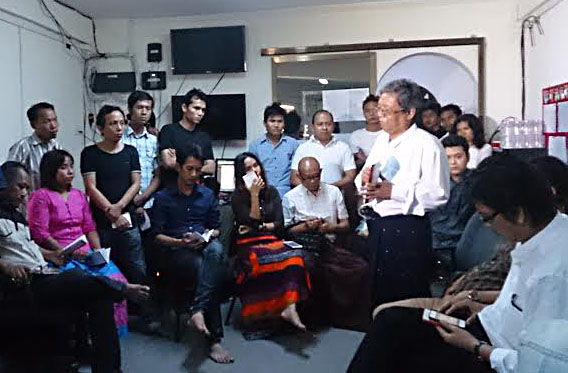As the National League for Democracy (NLD) prepares to take the reins at the end of this week, Burma’s media community is still split over whether to try to work within the current system or to continue to push for further reforms.
This divide has been especially pronounced since the formation late last year of a new Press Council to replace an earlier, provisional body created with a broad mandate to settle media disputes and protect the rights of journalists.
While the council was originally slated to have 29 members, today it has only 24–half of them appointed by the government and media organisations, the other half voted in by the other members–due to the refusal of some large media groups to participate.
The “interim” press council formed in 2012 was intended to fill the vacuum left by the abolition that year of the draconian censorship board that had controlled Burma’s media for decades. While the News Media Law enacted in 2014 called for the formation of a permanent council, it wasn’t until June of last year that it finally began to take shape; and it was only after several more months had passed that it came to assume its current, permanent form.
In all of its iterations, the council has been dogged by criticism that the President’s Office and the Ministry of Information exercise too much control over its operations. Sai Wai, the secretary of PEN Myanmar, went so far as to describe it as a “lobby group for the government.”
Most striking, he said, has been the council’s silence on the continuing practice of putting critics of the government behind bars. Though dozens of journalists and poets are currently in jail, Sai Wai noted that the Press Council “has not released any official statement” on the matter.
Dismissing government claims that repression of the press is now a thing of the past, he told DVB that the nation’s media laws have not been meaningfully reformed since the Ne Win era; PEN’s position, he said, is that nothing short of amending the country’s military-drafted 2008 Constitution would guarantee genuine media freedom. (PEN, along with Eleven Media, was among the media groups that refused to submit candidates for the new press council. Eleven Media could not be reached for comment last week.)
Not surprisingly, the Press Council’s general secretary, Thiha Saw, sees things very differently. Defending the work of the interim council, to which he also belonged, he said that though it had been heavily criticised, it was “able to achieve some stuff.”
He pointed to the dozens of workshops the council provided for local journalists, as well as the drafting of a code of conduct ahead of the 2015 elections. In addition, he said that he and his fellow interim council members often raised the issue of jailed reporters during meetings with President Thein Sein and Armed Forces Commander-in-Chief Senior General Min Aung Hlaing.
“There were attempts to open channels with the government,” he said.
Still, the veteran journalist and former political prisoner acknowledged that many changes still need to happen in the News Media Law. Speaking to DVB in his office in downtown Rangoon, he expressed cautious optimism about the possibilities of the NLD’s media policies.
During a recent media conference, “[The NLD] said they will do visible [reforms] within the first 100 days. Sounds good enough, but we have to wait and see how much they will change,” he said.
While he admits that the Press Council and the News Media Law are still in need of reform, Thiha Saw said he is committed to helping build “stable media institutions” that the country desperately needs.
While many media outfits are currently receiving training and support from groups like International Media Support and Internews, Thiha Saw stressed that the Press Council would be around for the long haul to help local media stand on its own.
“Those [international] media groups are here because the issue and the country is sexy,” he said. “Soon they will be gone.”
Correction: An earlier version of this article incorrectly identified the secretary of PEN Myanmar as Nay Phone Latt. The current secretary is Sai Wai; Nay Phone Latt is the former secretary.



